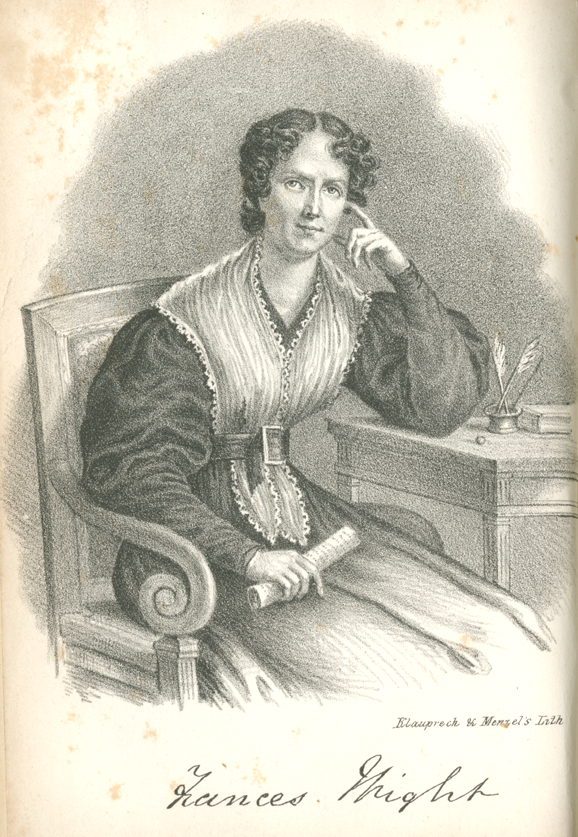Wednesday, February 29, 2012
Tweet-a-week: Frances Wright (1795 - 1852)
Born in Scotland, Frances Wright was a woman who supported the abolitionist movement and who possessed her own radical ideas that she aspired to share with the world (that's one thinking pose in the picture). In 1825, she founded her own utopian community called Nashoba where she had slaves work for money so that they would raise enough for their own emancipation. As part of the commune, she advocated for free love and sexual freedom, a decree that was quite controversial for the suggestion of interracial marriage -- an institution that defiled the marriage standard of the time. Nevertheless, her eagerness to promote equality among all connects well with Whitman's message that all are equally unique and of great significance. All should embrace each other and be open to "touch" (both literally and figuratively), regardless of anything that may label one inferior to the other. With that said, Wright was also a prominent advocate for women's rights. However, her stance and lectures were unpopular with many people (just look at this caricature from http://www.sparecandy.com/2010/07/in-history-frances-wright.html).
As a contemporary, Whitman even attended many of her lectures, and he had this to say:
"In those days I frequented the anti-slavery halls, in New York — heard many of their speakers — people of all qualities, styles — always interesting, always suggestive. It was there I heard Fanny Wright ... a woman of the noblest make-up whose orbit was a great deal larger than theirs — too large to be tolerated for long by them: a most maligned, lied-about character — one of the best in history though also one of the least understood. She had a varied career here and in France — married a damned scoundrel, lost her fortune, faced the world with her usual courage. Her crowning sorrow was when the infernal whelp who had been her husband tried in France, through the aid of a priest, to take from her her daughter, charging that the child needed to be protected from the danger of her mother's infidelistic teachings. Think of it! ... The scoundrel, through the aid of the French law, which is of all law probably the least favorable to women, got nearly her whole fortune, perhaps the whole of it, so that at the last, when she needed five thousand dollars or so, she had to beg it of him, he even then making the concession reluctantly. But my remembrance of her all centers about New York. She spoke in the old Tammany Hall there, every Sunday, about all sorts of reforms. Her views were very broad — she touched the widest range of themes — spoke informally, colloquially. She published while there the Free Inquirer, which my daddy took and I often read. She has always been to me one of the sweetest of sweet memories: we all loved her: fell down before her: her very appearance seemed to enthrall us. I had a picture of her about here — it is probably somewhere in the house still: a sitting figure — graceful, deer-like: and her countenance! oh! it was very serene."
He can related to her colloquial style of speaking and her open-minded views on many aspects of life -- all of which are characteristics of his own work in poems such as "Song of Myself" and "A Song for Occupations". He sympathized with the shared view of aiming toward a more Democratic America where equality reigns, regardless of race or gender. It is especially admirable that, even though there are people who do not agree with her and her radical ideas, she continued to press onward with getting her thoughts out there (the feminist movement of the 20th century used her ideas as part of their self-expression). She also possesses true benevolence for his fellow man, for, even though her project at Nashoba did not work out, she still had the remaining slaves transported to the freshly independent land of Haiti where they could live as free men and women -- a good Samaritan act that shares the same communal qualities as Whitman which can be referred to the treatment of the runaway slave in "Song of Myself".
After all, "She had all of Ingersoll's magnetism and perhaps more than his tact. ...She was a brilliant woman, of beauty and estate, who was never satisfied unless she was busy doing good — public good, private good." -- Walt Whitman
Sources:
"Frances Wright." eNotes. The Library Company of Philadelphia, n.d. Web. <http://www.librarycompany.org/women/portraits/wright.htm>.
"Frances Wright." Wikiquote. Wikiquote, 12 Aug 2011. Web. 1 Mar 2012. <http://en.wikiquote.org/wiki/Frances_Wright>.
"Fanny Wright." Spartacus International. N.p., 07 May 2002. Web. <http://www.spartacus.schoolnet.co.uk/REwright.htm>.
"Portraits of American Women Writers -- Frances Wright." The Library Company of Philadelphia. The Library Company of Philadelphia, n.d. Web. <http://www.librarycompany.org/women/portraits/wright.htm>.
Subscribe to:
Post Comments (Atom)

No comments:
Post a Comment